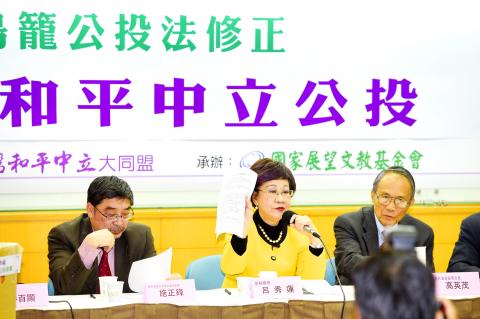The Peace and Neutrality for Taiwan Alliance, led by former vice president Annette Lu (呂秀蓮), yesterday stated its intention to hold a referendum for a neutral Taiwan in tandem with local elections next year, urging President Tsai Ing-wen (蔡英文) to sign and promulgate the amended Referendum Act (公民投票法) as soon as possible.
Lu told a news conference in Taipei that she believes that Taiwan must pursue neutrality and should not “sit idly by and wait for the end to come,” while sandwiched between China and the US.
We must make our own path and with the amendment of the Referendum Act, it is possible for the 23 million people of Taiwan to, with collective public wisdom, formulate the correct sort of public consciousness, Lu said.

Photo: George Tseng, Taipei Times
Our path would be one of peaceful neutrality, to focus on humanitarian efforts, to befriend the US and the Japanese while making peace with the Chinese, Lu said, adding that the ultimate goal is to establish friendly and egalitarian relations with other nations around the globe.
The proposal has more than 20,000 supporting signatures and was drafted in accordance with the original Referendum Act, the alliance said.
With the amendments passed on Tuesday, the proposal has reached the revised threshold.
Under the amended act, the threshold for initiation of a referendum was lowered from 0.005 percent of the electorate in the most recent presidential election — or about 90,000 people — to 0.0001 percent — or about 1,800 — while the second-stage signature threshold was dropped from 5 percent — or 900,000 voters — to 1.5 percent — or about 280,000.
The passing requirement has been amended to a simple majority vote that would see any referendum act passed if supporting votes exceed nay-saying votes and comprise one-quarter — instead of half — of the eligible voting population.
Once Tsai signs the bill, the alliance plans to submit its proposal to the Central Election Commission, Lu said, adding that the plan is to gather 280,000 signatures within six months and hold the referendum alongside next year’s nine-in-one local elections.
Former deputy minister of foreign affairs Michael Kau (高英茂) said that the Chinese “One Belt, One Road” policy and the US “Free and Open Indo-Pacific” policy is a new balance of terror.
The neutrality of Taiwan would not only maintain its safety, but also diffuse tension between the two world powers, a contribution to both Taiwan and the world alike, Kao said.
Former Nantou County commissioner Peng Pai-hsien (彭百顯) said he supports the “neutral Taiwan” concept out of concern that Taiwan’s national identity has been divided by potential resumption of hostilities with China.
In addition, Lu said that she is planning a forum to be held in March on the possibility and effects of Taiwan becoming neutral.
More than 30 experts and academics are to be invited from more than 10 countries, including the US and Japan, Lu said, adding that she is also trying to invite Chinese experts to the forum.

SECURITY: As China is ‘reshaping’ Hong Kong’s population, Taiwan must raise the eligibility threshold for applications from Hong Kongers, Chiu Chui-cheng said When Hong Kong and Macau citizens apply for residency in Taiwan, it would be under a new category that includes a “national security observation period,” Mainland Affairs Council (MAC) Minister Chiu Chui-cheng (邱垂正) said yesterday. President William Lai (賴清德) on March 13 announced 17 strategies to counter China’s aggression toward Taiwan, including incorporating national security considerations into the review process for residency applications from Hong Kong and Macau citizens. The situation in Hong Kong is constantly changing, Chiu said to media yesterday on the sidelines of the Taipei Technology Run hosted by the Taipei Neihu Technology Park Development Association. With

CARROT AND STICK: While unrelenting in its military threats, China attracted nearly 40,000 Taiwanese to over 400 business events last year Nearly 40,000 Taiwanese last year joined industry events in China, such as conferences and trade fairs, supported by the Chinese government, a study showed yesterday, as Beijing ramps up a charm offensive toward Taipei alongside military pressure. China has long taken a carrot-and-stick approach to Taiwan, threatening it with the prospect of military action while reaching out to those it believes are amenable to Beijing’s point of view. Taiwanese security officials are wary of what they see as Beijing’s influence campaigns to sway public opinion after Taipei and Beijing gradually resumed travel links halted by the COVID-19 pandemic, but the scale of

A US Marine Corps regiment equipped with Naval Strike Missiles (NSM) is set to participate in the upcoming Balikatan 25 exercise in the Luzon Strait, marking the system’s first-ever deployment in the Philippines. US and Philippine officials have separately confirmed that the Navy Marine Expeditionary Ship Interdiction System (NMESIS) — the mobile launch platform for the Naval Strike Missile — would take part in the joint exercise. The missiles are being deployed to “a strategic first island chain chokepoint” in the waters between Taiwan proper and the Philippines, US-based Naval News reported. “The Luzon Strait and Bashi Channel represent a critical access

Pope Francis is be laid to rest on Saturday after lying in state for three days in St Peter’s Basilica, where the faithful are expected to flock to pay their respects to history’s first Latin American pontiff. The cardinals met yesterday in the Vatican’s synod hall to chart the next steps before a conclave begins to choose Francis’ successor, as condolences poured in from around the world. According to current norms, the conclave must begin between May 5 and 10. The cardinals set the funeral for Saturday at 10am in St Peter’s Square, to be celebrated by the dean of the College